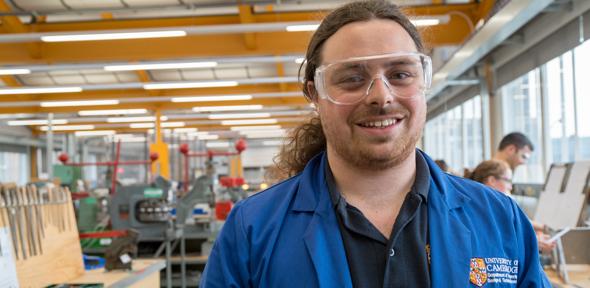New standards and funding arrangements for apprenticeships offer opportunities to expand training provision for both new and existing staff.
Apprenticeships might seem to be an old-fashioned way of training but they’re actually very relevant to the modern world. Not everyone leaves school wanting to do a degree, or even knowing what their goals are.
Alistair Ross
The Department of Engineering started its own programme of apprenticeships some time ago when it became clear that skills were being lost as an older generation of technicians retired and no-one was coming forward to replace them. Now, thanks to the apprenticeship levy, the Department is expanding its programme: using levy money to pay for the apprentices’ training has given the Department more money to spend on salaries.
Alistair Ross, Manager of Design and Technical Services at the Department of Engineering, finds training apprentices fulfilling for several reasons. He did an apprenticeship himself, which he calls “the best thing I ever did” and enjoys passing on his own love of making and machinery. He likes to see the young people he trains developing both as people and as technicians over the course of their apprenticeship.
Alistair said: “Apprenticeships might seem to be an old-fashioned way of training but they’re actually very relevant to the modern world. Not everyone leaves school wanting to do a degree, or even knowing what their goals are.”
The apprentices he has trained are now competent, confident young people with technical skills and a sense of direction in life – and the Department is now assured that it will have a steady supply of the skilled technicians it needs.

Daniel Philips, an apprentice in the Department of Engineering
About apprenticeships
Apprenticeships can be offered at many levels, from entry level up to management and degree/postgraduate level.
An apprenticeship is a job accompanied by training that meets an approved national standard (monitored by the Institute for Apprenticeships) and can be offered to existing employees as well as to new starters. All large employers contribute to an apprenticeship levy, and can use this money to train apprentices or provide additional training to existing staff.
The national expansion of apprenticeship standards and funding offers an opportunity to the University to enhance its offering of off-the-job training for both existing and new staff. This can help departments with succession planning, ensuring that skills gaps are plugged and important skills and knowledge are passed on.
Emma Stone, the Director of HR, said: “The University is pleased to be offering new and existing staff the opportunity to complete an apprenticeship, working in partnership with our training providers to offer employees the tools to develop their careers in a wide range of disciplines. There are many benefits to the University in having apprentices, and apprenticeships are yet another initiative that supports our aim of being an employer of choice.
"I'm looking forward to seeing how apprenticeships will increasingly offer development opportunities for people at all levels, building talent, offering career pathways and helping to ensure that Cambridge remains one of the world’s leading universities.”
Departments that currently offer apprenticeships include Estate Management, the Student Registry, the Department of Engineering and the Department of Physics, but the University is keen to see more departments taking advantage of the opportunities offered by apprenticeships, either to recruit new staff or to upskill current staff.
Three new apprenticeship standards are being launched soon: IT Applications Specialist (level 2); Business Administration (level 3) and Leadership and Management (level 5).
To find out more about creating and managing apprenticeships at Cambridge, visit www.apprenticeships.admin.cam.ac.uk

